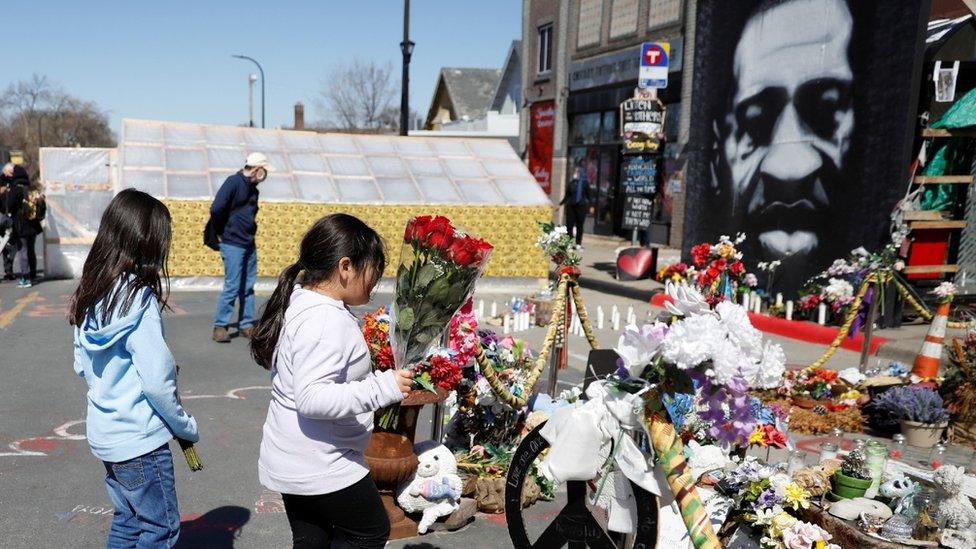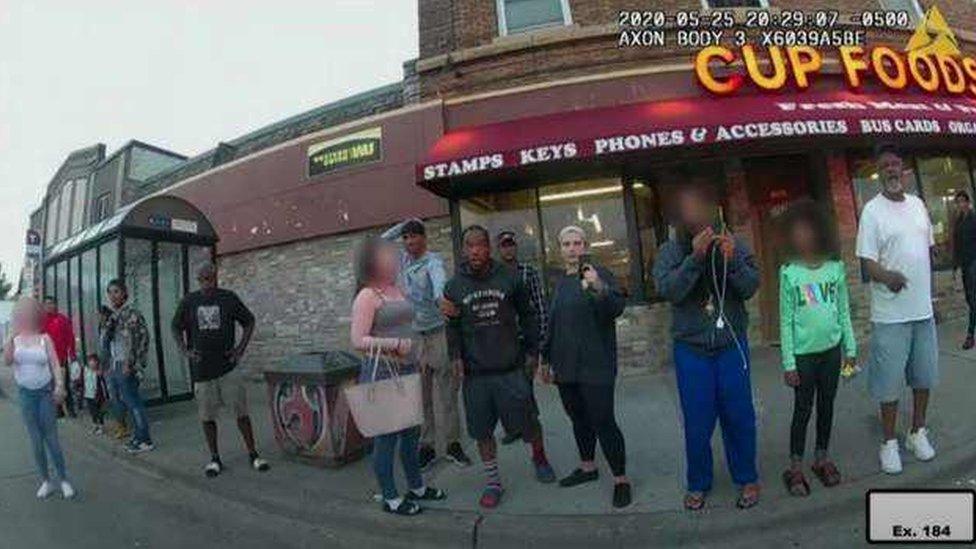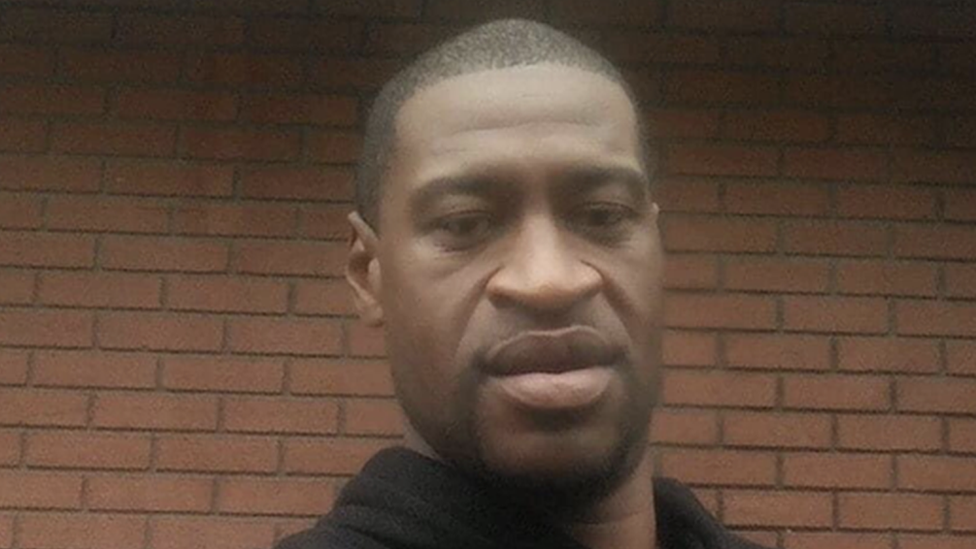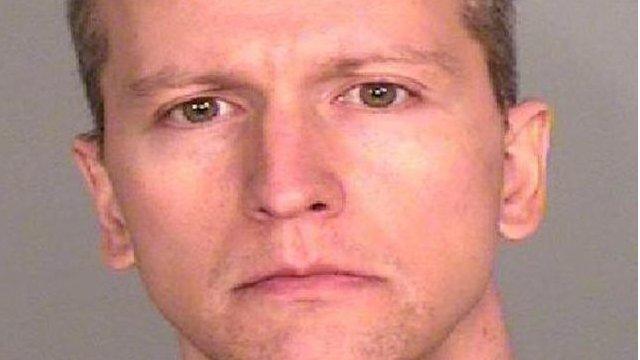Derek Chauvin trial: Homicide chief criticises force used on George Floyd
- Published
The dramatic moment paramedics arrive to Floyd arrest
The top homicide investigator in the US city of Minneapolis has said former police officer Derek Chauvin used "totally unnecessary" force when arresting George Floyd.
Richard Zimmerman was testifying on the fifth day of Mr Chauvin's murder trial.
White officer Mr Chauvin was filmed kneeling on African-American Mr Floyd's neck and back for more than nine minutes last May, sparking global protests.
The 45-year-old has denied charges of murder and manslaughter.
In his testimony on Friday, Lieutenant Zimmerman said he arrived on the scene after Mr Floyd's death in order to help ensure evidence was secured and witnesses were found.
He said officers were responsible for the safety and wellbeing of anyone they arrested.
"Totally unnecessary," he said, when asked about Mr Chauvin's actions. "If your knee is on a person's neck, that can kill them."
He added that he could see no reason for Mr Chauvin to keep his knee on Mr Floyd for more than nine minutes.
"First of all, pulling him down to the ground facedown and putting your knee on a neck for that amount of time is just uncalled for," he said.
"I saw no reason why the officers felt they were in danger, if that's what they felt... and that's what they would have to have felt to be able to use that kind of force."
What else has happened at the trial?
Paramedics, bystanders and Mr Floyd's girlfriend are among those who have taken the stand since the trial began on Monday.
At its opening, prosecutor Jerry Blackwell said Mr Chauvin had "betrayed his badge" and claimed he used "excessive and unreasonable force".
Defence lawyers have indicated they will argue that Mr Floyd died of an overdose and poor health, and the force used in his arrest was reasonable.
Footage from both witnesses' mobile phones and the police officers' bodycams have been shown to the jury at length.
In one video, Mr Floyd could be heard pleading with officers, saying: "I'm not a bad guy".
In another, Mr Chauvin is heard telling a bystander: "We had to control this guy because he's a sizeable guy. It looks like he's probably on something."

The court also examined security camera footage of Mr Floyd inside a grocery store, where he allegedly paid for a packet of cigarettes with a counterfeit note, leading to his arrest.
Shop employee Christopher Martin said Mr Floyd "didn't seem to know it was a fake note", adding that he watched the arrest with "disbelief and guilt".
Mr Floyd's girlfriend, Courteney Ross, gave emotional testimony, in which she described their first kiss and struggle with opioid addiction.
Two paramedics later said Mr Floyd had no pulse and did not appear to be breathing when they arrived at the scene.
Jurors have also heard from David Pleoger, the supervising police officer on duty that day, who said he only learned later in the evening that Mr Chauvin had restrained Mr Floyd by kneeling on his neck.


He told the court that an officer should stop using the knee as a restraint once "you get control of the situation" and the suspect is in handcuffs.
Defence lawyer Eric Nelson sought to play down the significance of his testimony by saying Mr Pleoger had "not reviewed the entirety of the evidence in this particular case".
Throughout the testimony, Mr Chauvin has been taking almost constant notes.

An anxious wait for Minneapolis

For many people here, the first week of the trial has been deeply traumatic - opening wounds from last May, when George Floyd died.
In the courtroom jurors heard wrenching accounts from eyewitnesses, people who were outside the store, Cup Foods, where Mr Floyd was arrested.
The jurors also listened to police testimony and statements from paramedics, and watched searing footage of the moments before Mr Floyd died, filmed on police body camera and shown for the first time in public. The images reminded people in town of what happened on that day, and how the city was ripped apart by his death.
For some, the evidence that was presented in the courtroom brought back a sense of despair and helplessness, as they themselves had watched the events outside of the store unfold.
All week, people scrolled through their phones in the downtown area, watching the trial. Others stood in stunned silence as the images appeared on TV screens in barbershops, convenience stores and other places in town.
On Monday, the trial continues.

Why is the case so important?
Footage of Mr Chauvin kneeling on Mr Floyd's neck was viewed around the world and sparked mass demonstrations against racism and police brutality.
Former US President Barack Obama said the protests represented a "genuine and legitimate frustration over a decades-long failure to reform police practices and the broader criminal justice system".
Police officers have rarely been convicted - if they are charged at all - for deaths that occur in custody, and the verdict in this trial is being widely seen as an indication of how the US legal system will treat such cases in future.
- Published18 April 2021

- Published16 July 2020

- Published10 March 2021
